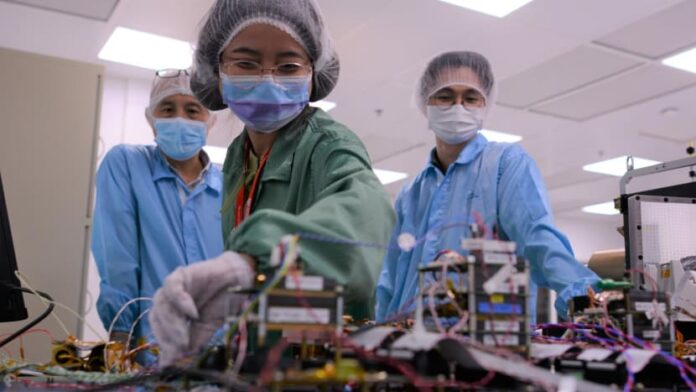SINGAPORE: Singapore will explore new frontiers in space by launching microsatellites the size of mini-refrigerators.
A “pioneering project” led by the Nanyang Technological University (NTU) Satellite Research Centre will see a 100kg remote sensing microsatellite launched into space.
The project is a research collaboration agreement between NTU, Aliena, LightHaus Photonics, ST Engineering and the National University of Singapore Temasek Lab, the group said in a joint press release on Wednesday (Feb 9).
It will also be supported by the Office of Space Technology and Industry, National Space Office, Singapore. ST Engineering Satellite Systems will advise on the system development and manufacture of microsatellites.
“Fuel saving engine”
The new microsatellites will fly in very low Earth orbit (VLEO) about 250 kilometers above Earth, according to the joint press release.
Since this is at least half the low-Earth orbit altitude (500km to 800km) commonly used by conventional satellites, it brings the promise of “differentiated capabilities”, such as the ability of instruments to perform better when they are closer to Earth.
However, the challenges of flying at VLEO include that if the satellite is not equipped with a suitable propulsion system, the satellite will “deorbit and re-enter” Earth’s atmosphere within a few days.
To overcome this problem, NTU spinoff Aliena has designed a “unique, fuel-efficient engine” to “ionize and accelerate inert propellants,” according to the release.
This will generate “low power thrust” that maintains the satellite’s orbit.
The tiny satellite will also house Singapore’s first local space camera designed by technology company LightHaus Photonics.
The camera can take high-resolution images of objects as small as 0.5 meters from space and is 20 times more powerful than the camera in X-SAT, Singapore’s first locally built satellite launched in 2011.
“It’s useful for industrial applications such as supply chain monitoring, agriculture and mining, and real estate analytics,” the press release said.
The satellite will also collect “valuable data to support the development of next-generation commercial VLEO satellites with multiple applications.”
These range from communications and imaging to climate and weather monitoring, which will help position Singapore as a hub for VLEO solutions, the release added.
reduce drag
In addition, NTU will develop “predictive aerodynamic models” to optimize satellite design to reduce drag.
Researchers will evaluate different materials that can prevent atomic oxygen corrosion and measure plasma concentrations, velocities and temperatures in the ionosphere to improve understanding of spacecraft charging.
“Spacecraft charging is a phenomenon where, due to hot electrons found in space, negative charges begin to build up on the surface of a satellite, which can cause damage to the satellite’s electronic systems,” the organizations explained.
The new microsatellites are also designed to be sustainable. At the end of its useful life, its engines can be shut down, and the satellite will “deorbit” and descend to Earth within a few days.
It will eventually burn up in the atmosphere upon re-entry, leaving no debris in space.
This “passive cleanup” will help minimize the risk of future collisions with other VLEO spacecraft compared to operating in “increasingly crowded” low-Earth orbits, the release added.
NTU Research Senior Vice President Professor Lim Chin Yong said the new microsatellite would be another milestone for Singapore and NTU.
“Satellite technology is always multidisciplinary and complex, requiring great talent in various fields, from power systems engineering to aerodynamics and software design, to work together as a team to develop new solutions that don’t exist today,” he said.
“The establishment of a new consortium to develop solutions to enable satellites to operate in very low Earth orbit is a testament to the development of disruptive technologies for space by industry and academia in Singapore,” said Dr David Tan, Executive Director of the Office of Space Technology and Industry.






